Business Ethics Case Study Analysis: Competitive Intelligence
VerifiedAdded on 2020/04/29
|11
|2477
|75
Case Study
AI Summary
This case study examines a business ethics scenario where Michael faces an ethical dilemma due to his boss's unethical acquisition of a competitor's data. The analysis identifies the core ethical issue as competitive intelligence spying, which is deemed unethical due to its unlawful nature and potential misuse of confidential information. Michael is advised to uphold virtue ethics and utilitarianism, advocating for honesty, fairness, and maximizing overall benefit. The case highlights the unethical conduct of Michael's boss, who engaged in corporate espionage. The study also delves into the concept of whistleblowing, emphasizing its importance in exposing unethical behavior and protecting individuals. Finally, it underscores the relevance of ethics in business, including its ability to attract customers, investors, and employees, ultimately contributing to increased productivity and a positive reputation. The conclusion reiterates Michael's ethical obligation to refrain from using the information and to consider whistleblowing, ensuring all alternatives are exhausted. The study emphasizes the advantages of an ethical business for sustainable growth.

Paraphrase This Document
Need a fresh take? Get an instant paraphrase of this document with our AI Paraphraser
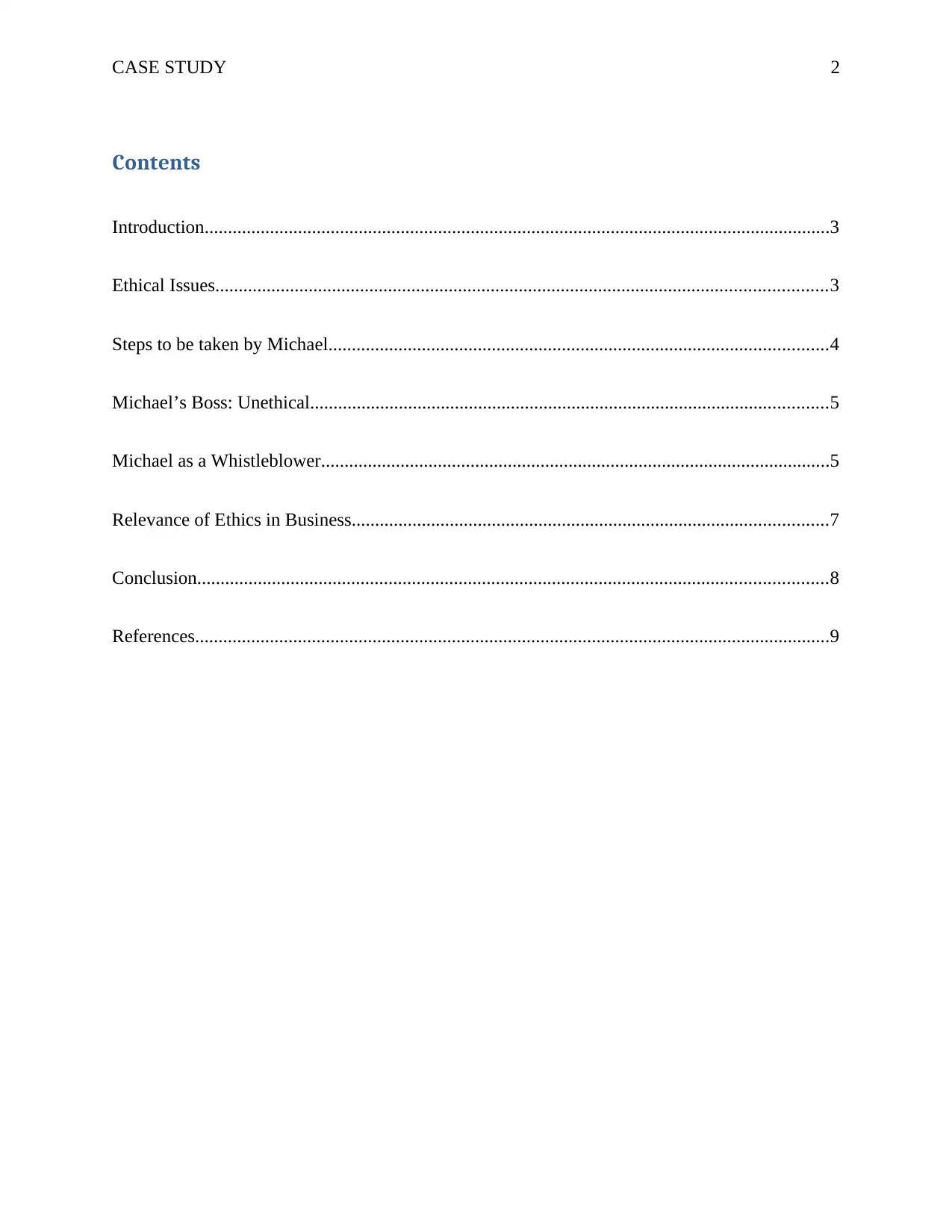
CASE STUDY 2
Contents
Introduction......................................................................................................................................3
Ethical Issues...................................................................................................................................3
Steps to be taken by Michael...........................................................................................................4
Michael’s Boss: Unethical...............................................................................................................5
Michael as a Whistleblower.............................................................................................................5
Relevance of Ethics in Business......................................................................................................7
Conclusion.......................................................................................................................................8
References........................................................................................................................................9
Contents
Introduction......................................................................................................................................3
Ethical Issues...................................................................................................................................3
Steps to be taken by Michael...........................................................................................................4
Michael’s Boss: Unethical...............................................................................................................5
Michael as a Whistleblower.............................................................................................................5
Relevance of Ethics in Business......................................................................................................7
Conclusion.......................................................................................................................................8
References........................................................................................................................................9
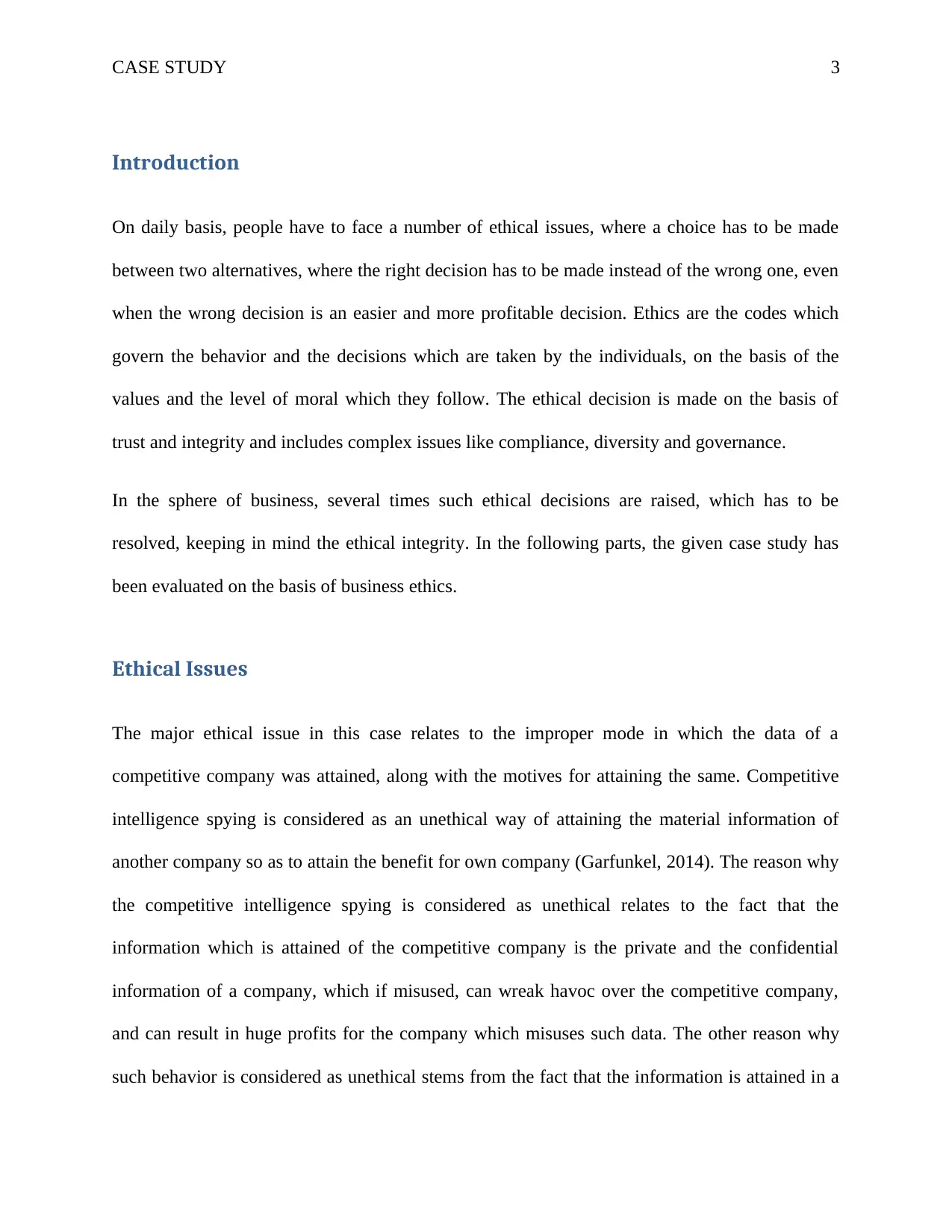
CASE STUDY 3
Introduction
On daily basis, people have to face a number of ethical issues, where a choice has to be made
between two alternatives, where the right decision has to be made instead of the wrong one, even
when the wrong decision is an easier and more profitable decision. Ethics are the codes which
govern the behavior and the decisions which are taken by the individuals, on the basis of the
values and the level of moral which they follow. The ethical decision is made on the basis of
trust and integrity and includes complex issues like compliance, diversity and governance.
In the sphere of business, several times such ethical decisions are raised, which has to be
resolved, keeping in mind the ethical integrity. In the following parts, the given case study has
been evaluated on the basis of business ethics.
Ethical Issues
The major ethical issue in this case relates to the improper mode in which the data of a
competitive company was attained, along with the motives for attaining the same. Competitive
intelligence spying is considered as an unethical way of attaining the material information of
another company so as to attain the benefit for own company (Garfunkel, 2014). The reason why
the competitive intelligence spying is considered as unethical relates to the fact that the
information which is attained of the competitive company is the private and the confidential
information of a company, which if misused, can wreak havoc over the competitive company,
and can result in huge profits for the company which misuses such data. The other reason why
such behavior is considered as unethical stems from the fact that the information is attained in a
Introduction
On daily basis, people have to face a number of ethical issues, where a choice has to be made
between two alternatives, where the right decision has to be made instead of the wrong one, even
when the wrong decision is an easier and more profitable decision. Ethics are the codes which
govern the behavior and the decisions which are taken by the individuals, on the basis of the
values and the level of moral which they follow. The ethical decision is made on the basis of
trust and integrity and includes complex issues like compliance, diversity and governance.
In the sphere of business, several times such ethical decisions are raised, which has to be
resolved, keeping in mind the ethical integrity. In the following parts, the given case study has
been evaluated on the basis of business ethics.
Ethical Issues
The major ethical issue in this case relates to the improper mode in which the data of a
competitive company was attained, along with the motives for attaining the same. Competitive
intelligence spying is considered as an unethical way of attaining the material information of
another company so as to attain the benefit for own company (Garfunkel, 2014). The reason why
the competitive intelligence spying is considered as unethical relates to the fact that the
information which is attained of the competitive company is the private and the confidential
information of a company, which if misused, can wreak havoc over the competitive company,
and can result in huge profits for the company which misuses such data. The other reason why
such behavior is considered as unethical stems from the fact that the information is attained in a
⊘ This is a preview!⊘
Do you want full access?
Subscribe today to unlock all pages.

Trusted by 1+ million students worldwide
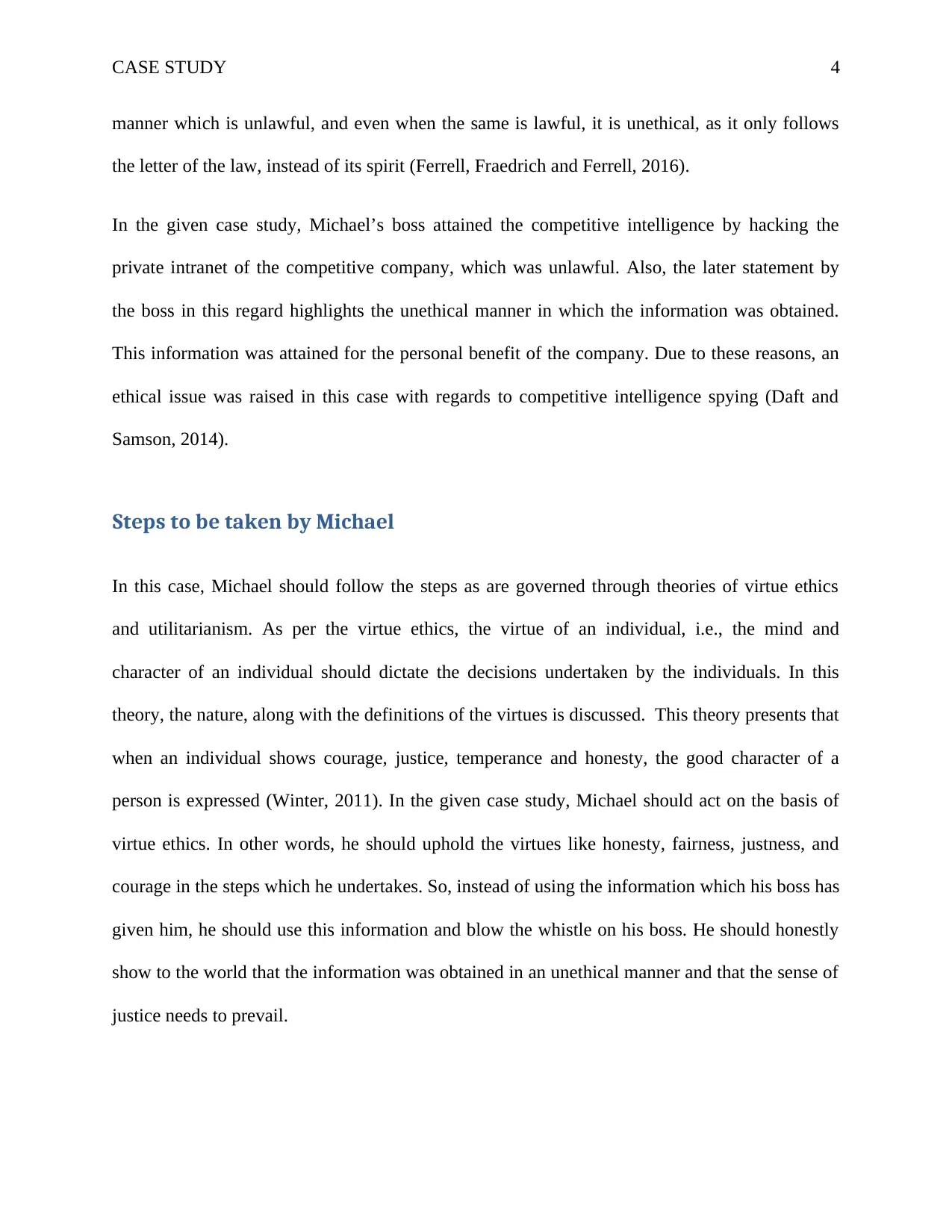
CASE STUDY 4
manner which is unlawful, and even when the same is lawful, it is unethical, as it only follows
the letter of the law, instead of its spirit (Ferrell, Fraedrich and Ferrell, 2016).
In the given case study, Michael’s boss attained the competitive intelligence by hacking the
private intranet of the competitive company, which was unlawful. Also, the later statement by
the boss in this regard highlights the unethical manner in which the information was obtained.
This information was attained for the personal benefit of the company. Due to these reasons, an
ethical issue was raised in this case with regards to competitive intelligence spying (Daft and
Samson, 2014).
Steps to be taken by Michael
In this case, Michael should follow the steps as are governed through theories of virtue ethics
and utilitarianism. As per the virtue ethics, the virtue of an individual, i.e., the mind and
character of an individual should dictate the decisions undertaken by the individuals. In this
theory, the nature, along with the definitions of the virtues is discussed. This theory presents that
when an individual shows courage, justice, temperance and honesty, the good character of a
person is expressed (Winter, 2011). In the given case study, Michael should act on the basis of
virtue ethics. In other words, he should uphold the virtues like honesty, fairness, justness, and
courage in the steps which he undertakes. So, instead of using the information which his boss has
given him, he should use this information and blow the whistle on his boss. He should honestly
show to the world that the information was obtained in an unethical manner and that the sense of
justice needs to prevail.
manner which is unlawful, and even when the same is lawful, it is unethical, as it only follows
the letter of the law, instead of its spirit (Ferrell, Fraedrich and Ferrell, 2016).
In the given case study, Michael’s boss attained the competitive intelligence by hacking the
private intranet of the competitive company, which was unlawful. Also, the later statement by
the boss in this regard highlights the unethical manner in which the information was obtained.
This information was attained for the personal benefit of the company. Due to these reasons, an
ethical issue was raised in this case with regards to competitive intelligence spying (Daft and
Samson, 2014).
Steps to be taken by Michael
In this case, Michael should follow the steps as are governed through theories of virtue ethics
and utilitarianism. As per the virtue ethics, the virtue of an individual, i.e., the mind and
character of an individual should dictate the decisions undertaken by the individuals. In this
theory, the nature, along with the definitions of the virtues is discussed. This theory presents that
when an individual shows courage, justice, temperance and honesty, the good character of a
person is expressed (Winter, 2011). In the given case study, Michael should act on the basis of
virtue ethics. In other words, he should uphold the virtues like honesty, fairness, justness, and
courage in the steps which he undertakes. So, instead of using the information which his boss has
given him, he should use this information and blow the whistle on his boss. He should honestly
show to the world that the information was obtained in an unethical manner and that the sense of
justice needs to prevail.
Paraphrase This Document
Need a fresh take? Get an instant paraphrase of this document with our AI Paraphraser
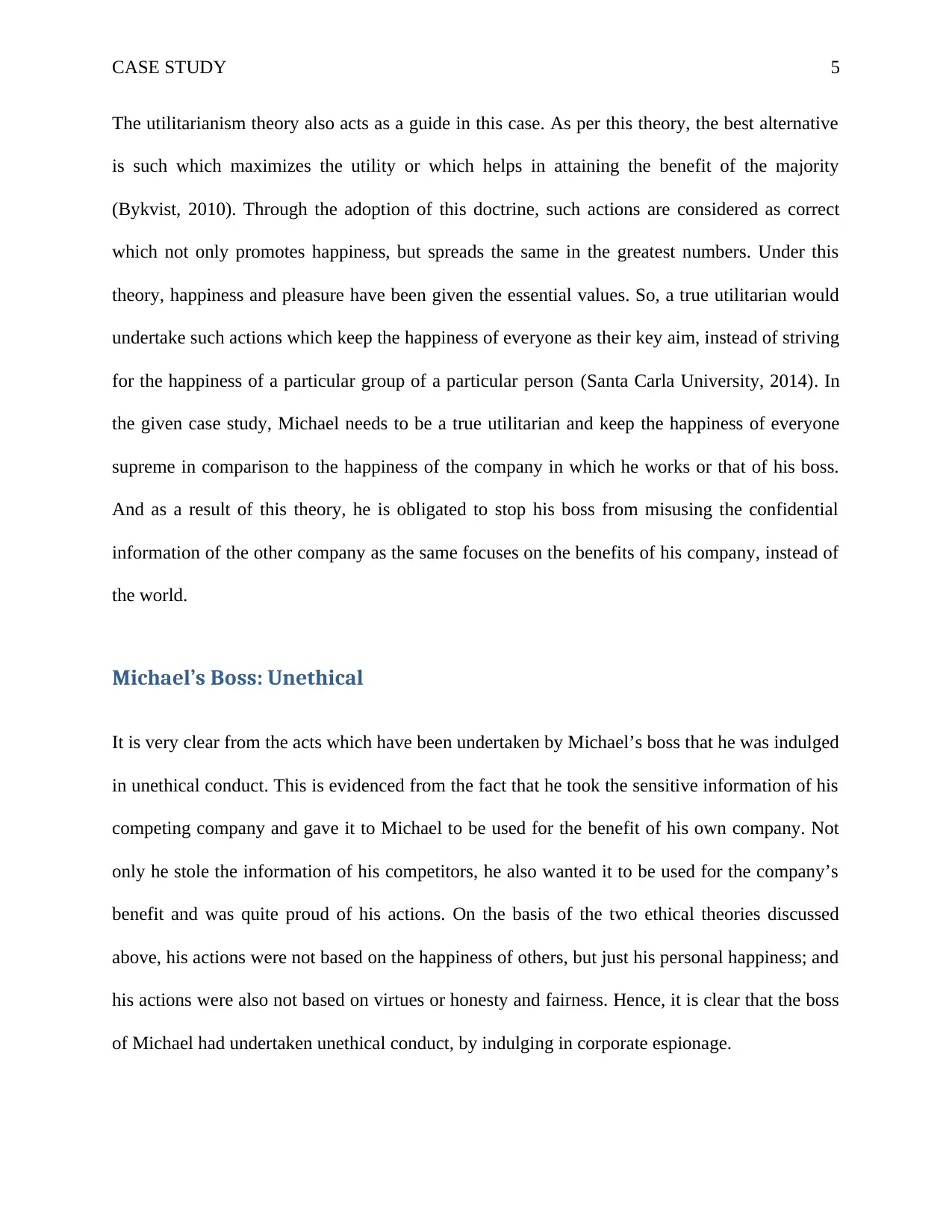
CASE STUDY 5
The utilitarianism theory also acts as a guide in this case. As per this theory, the best alternative
is such which maximizes the utility or which helps in attaining the benefit of the majority
(Bykvist, 2010). Through the adoption of this doctrine, such actions are considered as correct
which not only promotes happiness, but spreads the same in the greatest numbers. Under this
theory, happiness and pleasure have been given the essential values. So, a true utilitarian would
undertake such actions which keep the happiness of everyone as their key aim, instead of striving
for the happiness of a particular group of a particular person (Santa Carla University, 2014). In
the given case study, Michael needs to be a true utilitarian and keep the happiness of everyone
supreme in comparison to the happiness of the company in which he works or that of his boss.
And as a result of this theory, he is obligated to stop his boss from misusing the confidential
information of the other company as the same focuses on the benefits of his company, instead of
the world.
Michael’s Boss: Unethical
It is very clear from the acts which have been undertaken by Michael’s boss that he was indulged
in unethical conduct. This is evidenced from the fact that he took the sensitive information of his
competing company and gave it to Michael to be used for the benefit of his own company. Not
only he stole the information of his competitors, he also wanted it to be used for the company’s
benefit and was quite proud of his actions. On the basis of the two ethical theories discussed
above, his actions were not based on the happiness of others, but just his personal happiness; and
his actions were also not based on virtues or honesty and fairness. Hence, it is clear that the boss
of Michael had undertaken unethical conduct, by indulging in corporate espionage.
The utilitarianism theory also acts as a guide in this case. As per this theory, the best alternative
is such which maximizes the utility or which helps in attaining the benefit of the majority
(Bykvist, 2010). Through the adoption of this doctrine, such actions are considered as correct
which not only promotes happiness, but spreads the same in the greatest numbers. Under this
theory, happiness and pleasure have been given the essential values. So, a true utilitarian would
undertake such actions which keep the happiness of everyone as their key aim, instead of striving
for the happiness of a particular group of a particular person (Santa Carla University, 2014). In
the given case study, Michael needs to be a true utilitarian and keep the happiness of everyone
supreme in comparison to the happiness of the company in which he works or that of his boss.
And as a result of this theory, he is obligated to stop his boss from misusing the confidential
information of the other company as the same focuses on the benefits of his company, instead of
the world.
Michael’s Boss: Unethical
It is very clear from the acts which have been undertaken by Michael’s boss that he was indulged
in unethical conduct. This is evidenced from the fact that he took the sensitive information of his
competing company and gave it to Michael to be used for the benefit of his own company. Not
only he stole the information of his competitors, he also wanted it to be used for the company’s
benefit and was quite proud of his actions. On the basis of the two ethical theories discussed
above, his actions were not based on the happiness of others, but just his personal happiness; and
his actions were also not based on virtues or honesty and fairness. Hence, it is clear that the boss
of Michael had undertaken unethical conduct, by indulging in corporate espionage.
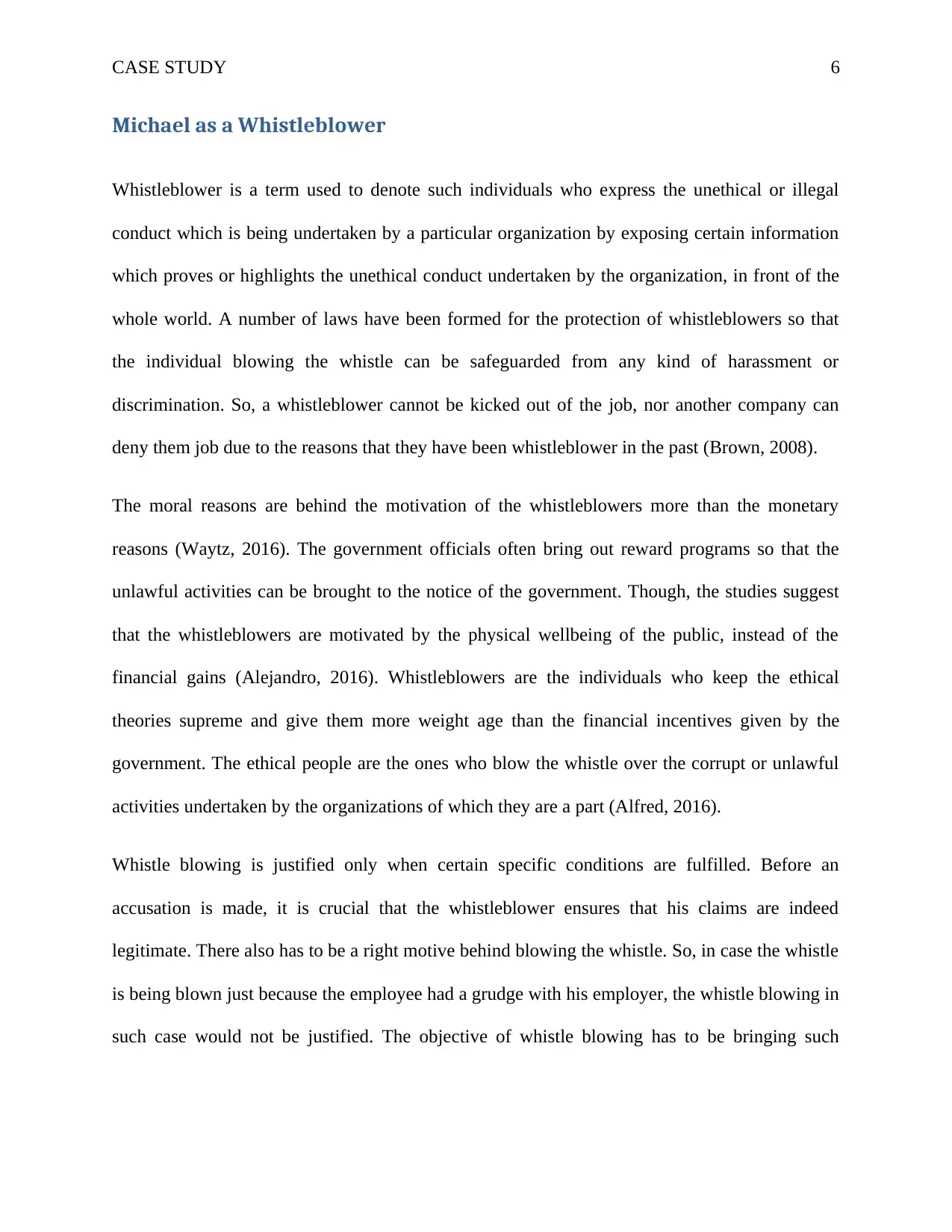
CASE STUDY 6
Michael as a Whistleblower
Whistleblower is a term used to denote such individuals who express the unethical or illegal
conduct which is being undertaken by a particular organization by exposing certain information
which proves or highlights the unethical conduct undertaken by the organization, in front of the
whole world. A number of laws have been formed for the protection of whistleblowers so that
the individual blowing the whistle can be safeguarded from any kind of harassment or
discrimination. So, a whistleblower cannot be kicked out of the job, nor another company can
deny them job due to the reasons that they have been whistleblower in the past (Brown, 2008).
The moral reasons are behind the motivation of the whistleblowers more than the monetary
reasons (Waytz, 2016). The government officials often bring out reward programs so that the
unlawful activities can be brought to the notice of the government. Though, the studies suggest
that the whistleblowers are motivated by the physical wellbeing of the public, instead of the
financial gains (Alejandro, 2016). Whistleblowers are the individuals who keep the ethical
theories supreme and give them more weight age than the financial incentives given by the
government. The ethical people are the ones who blow the whistle over the corrupt or unlawful
activities undertaken by the organizations of which they are a part (Alfred, 2016).
Whistle blowing is justified only when certain specific conditions are fulfilled. Before an
accusation is made, it is crucial that the whistleblower ensures that his claims are indeed
legitimate. There also has to be a right motive behind blowing the whistle. So, in case the whistle
is being blown just because the employee had a grudge with his employer, the whistle blowing in
such case would not be justified. The objective of whistle blowing has to be bringing such
Michael as a Whistleblower
Whistleblower is a term used to denote such individuals who express the unethical or illegal
conduct which is being undertaken by a particular organization by exposing certain information
which proves or highlights the unethical conduct undertaken by the organization, in front of the
whole world. A number of laws have been formed for the protection of whistleblowers so that
the individual blowing the whistle can be safeguarded from any kind of harassment or
discrimination. So, a whistleblower cannot be kicked out of the job, nor another company can
deny them job due to the reasons that they have been whistleblower in the past (Brown, 2008).
The moral reasons are behind the motivation of the whistleblowers more than the monetary
reasons (Waytz, 2016). The government officials often bring out reward programs so that the
unlawful activities can be brought to the notice of the government. Though, the studies suggest
that the whistleblowers are motivated by the physical wellbeing of the public, instead of the
financial gains (Alejandro, 2016). Whistleblowers are the individuals who keep the ethical
theories supreme and give them more weight age than the financial incentives given by the
government. The ethical people are the ones who blow the whistle over the corrupt or unlawful
activities undertaken by the organizations of which they are a part (Alfred, 2016).
Whistle blowing is justified only when certain specific conditions are fulfilled. Before an
accusation is made, it is crucial that the whistleblower ensures that his claims are indeed
legitimate. There also has to be a right motive behind blowing the whistle. So, in case the whistle
is being blown just because the employee had a grudge with his employer, the whistle blowing in
such case would not be justified. The objective of whistle blowing has to be bringing such
⊘ This is a preview!⊘
Do you want full access?
Subscribe today to unlock all pages.

Trusted by 1+ million students worldwide
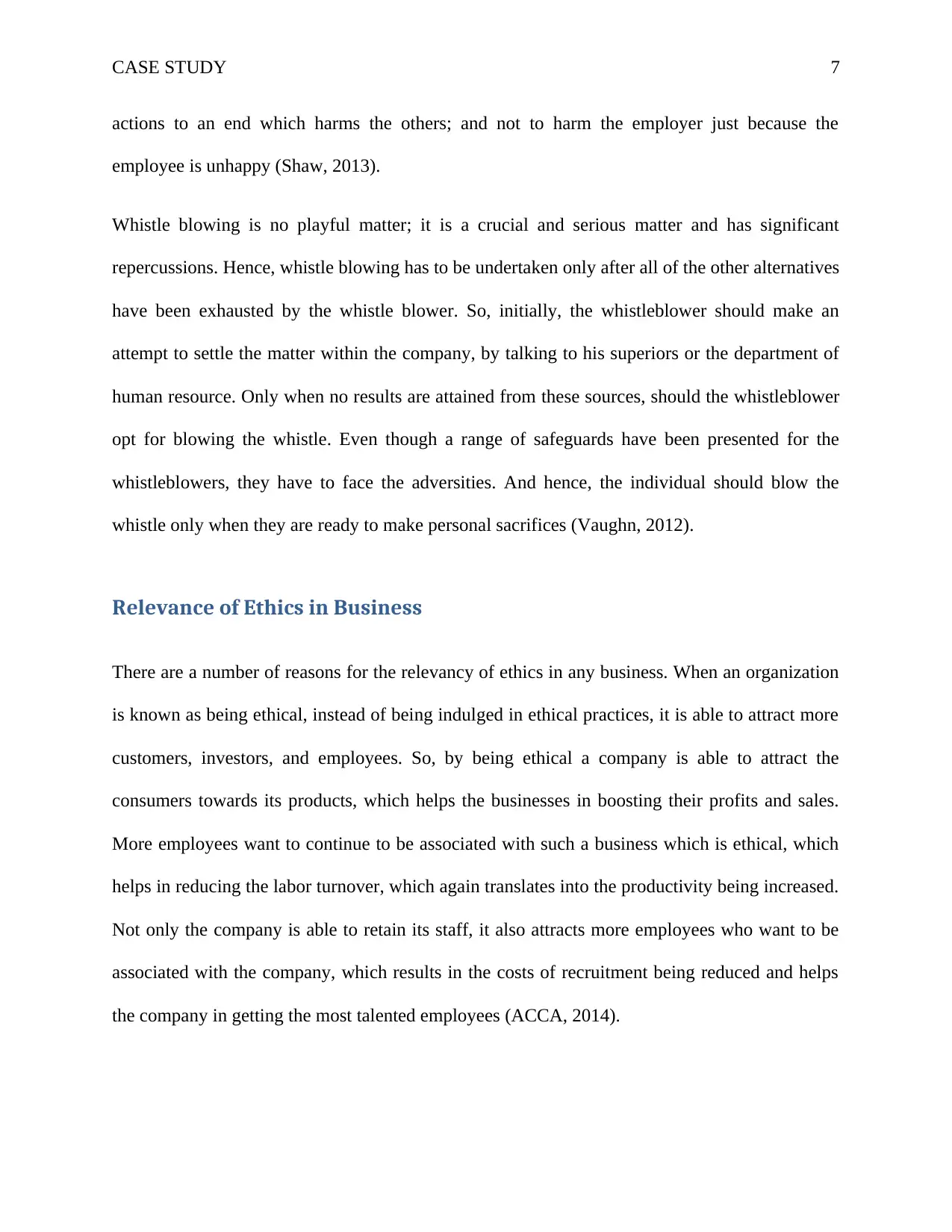
CASE STUDY 7
actions to an end which harms the others; and not to harm the employer just because the
employee is unhappy (Shaw, 2013).
Whistle blowing is no playful matter; it is a crucial and serious matter and has significant
repercussions. Hence, whistle blowing has to be undertaken only after all of the other alternatives
have been exhausted by the whistle blower. So, initially, the whistleblower should make an
attempt to settle the matter within the company, by talking to his superiors or the department of
human resource. Only when no results are attained from these sources, should the whistleblower
opt for blowing the whistle. Even though a range of safeguards have been presented for the
whistleblowers, they have to face the adversities. And hence, the individual should blow the
whistle only when they are ready to make personal sacrifices (Vaughn, 2012).
Relevance of Ethics in Business
There are a number of reasons for the relevancy of ethics in any business. When an organization
is known as being ethical, instead of being indulged in ethical practices, it is able to attract more
customers, investors, and employees. So, by being ethical a company is able to attract the
consumers towards its products, which helps the businesses in boosting their profits and sales.
More employees want to continue to be associated with such a business which is ethical, which
helps in reducing the labor turnover, which again translates into the productivity being increased.
Not only the company is able to retain its staff, it also attracts more employees who want to be
associated with the company, which results in the costs of recruitment being reduced and helps
the company in getting the most talented employees (ACCA, 2014).
actions to an end which harms the others; and not to harm the employer just because the
employee is unhappy (Shaw, 2013).
Whistle blowing is no playful matter; it is a crucial and serious matter and has significant
repercussions. Hence, whistle blowing has to be undertaken only after all of the other alternatives
have been exhausted by the whistle blower. So, initially, the whistleblower should make an
attempt to settle the matter within the company, by talking to his superiors or the department of
human resource. Only when no results are attained from these sources, should the whistleblower
opt for blowing the whistle. Even though a range of safeguards have been presented for the
whistleblowers, they have to face the adversities. And hence, the individual should blow the
whistle only when they are ready to make personal sacrifices (Vaughn, 2012).
Relevance of Ethics in Business
There are a number of reasons for the relevancy of ethics in any business. When an organization
is known as being ethical, instead of being indulged in ethical practices, it is able to attract more
customers, investors, and employees. So, by being ethical a company is able to attract the
consumers towards its products, which helps the businesses in boosting their profits and sales.
More employees want to continue to be associated with such a business which is ethical, which
helps in reducing the labor turnover, which again translates into the productivity being increased.
Not only the company is able to retain its staff, it also attracts more employees who want to be
associated with the company, which results in the costs of recruitment being reduced and helps
the company in getting the most talented employees (ACCA, 2014).
Paraphrase This Document
Need a fresh take? Get an instant paraphrase of this document with our AI Paraphraser
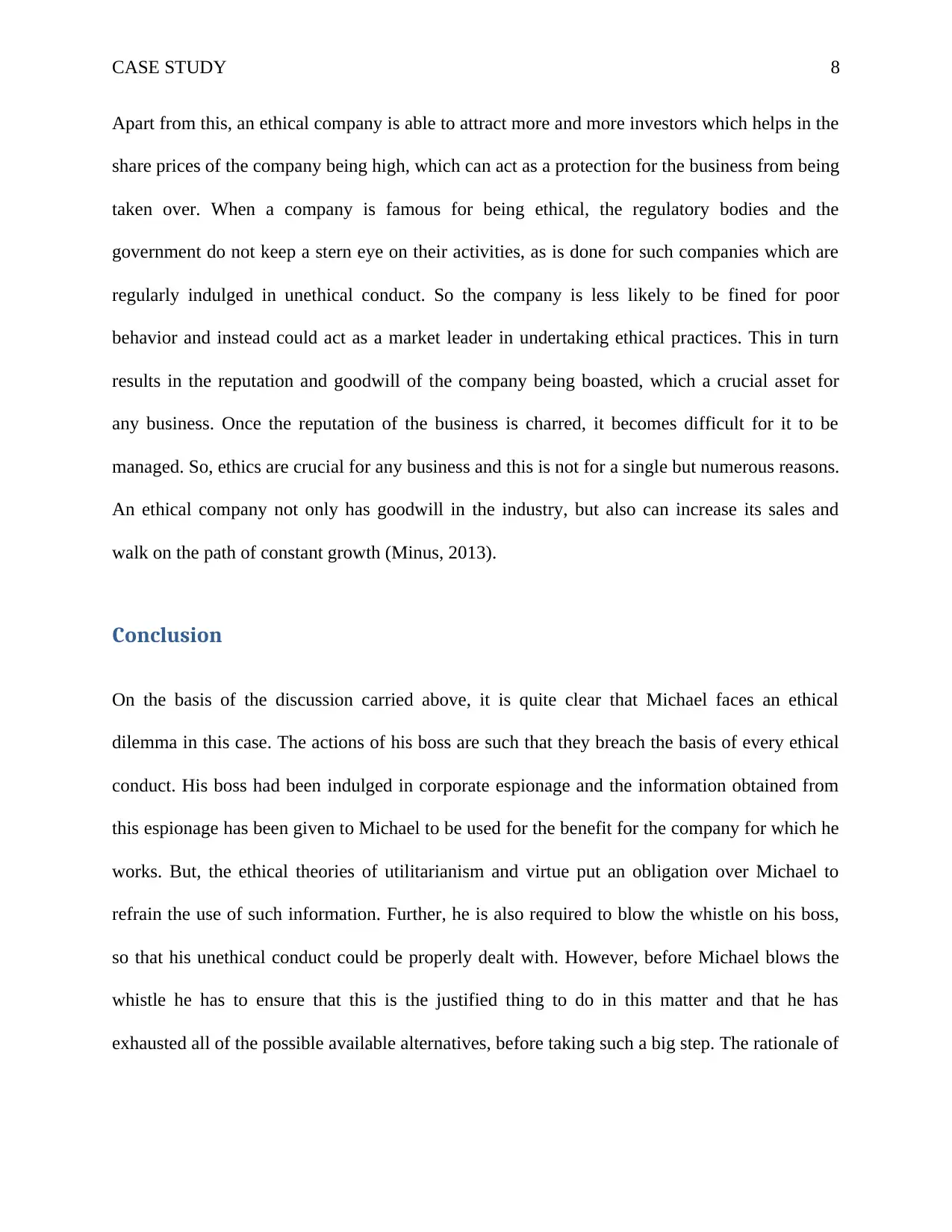
CASE STUDY 8
Apart from this, an ethical company is able to attract more and more investors which helps in the
share prices of the company being high, which can act as a protection for the business from being
taken over. When a company is famous for being ethical, the regulatory bodies and the
government do not keep a stern eye on their activities, as is done for such companies which are
regularly indulged in unethical conduct. So the company is less likely to be fined for poor
behavior and instead could act as a market leader in undertaking ethical practices. This in turn
results in the reputation and goodwill of the company being boasted, which a crucial asset for
any business. Once the reputation of the business is charred, it becomes difficult for it to be
managed. So, ethics are crucial for any business and this is not for a single but numerous reasons.
An ethical company not only has goodwill in the industry, but also can increase its sales and
walk on the path of constant growth (Minus, 2013).
Conclusion
On the basis of the discussion carried above, it is quite clear that Michael faces an ethical
dilemma in this case. The actions of his boss are such that they breach the basis of every ethical
conduct. His boss had been indulged in corporate espionage and the information obtained from
this espionage has been given to Michael to be used for the benefit for the company for which he
works. But, the ethical theories of utilitarianism and virtue put an obligation over Michael to
refrain the use of such information. Further, he is also required to blow the whistle on his boss,
so that his unethical conduct could be properly dealt with. However, before Michael blows the
whistle he has to ensure that this is the justified thing to do in this matter and that he has
exhausted all of the possible available alternatives, before taking such a big step. The rationale of
Apart from this, an ethical company is able to attract more and more investors which helps in the
share prices of the company being high, which can act as a protection for the business from being
taken over. When a company is famous for being ethical, the regulatory bodies and the
government do not keep a stern eye on their activities, as is done for such companies which are
regularly indulged in unethical conduct. So the company is less likely to be fined for poor
behavior and instead could act as a market leader in undertaking ethical practices. This in turn
results in the reputation and goodwill of the company being boasted, which a crucial asset for
any business. Once the reputation of the business is charred, it becomes difficult for it to be
managed. So, ethics are crucial for any business and this is not for a single but numerous reasons.
An ethical company not only has goodwill in the industry, but also can increase its sales and
walk on the path of constant growth (Minus, 2013).
Conclusion
On the basis of the discussion carried above, it is quite clear that Michael faces an ethical
dilemma in this case. The actions of his boss are such that they breach the basis of every ethical
conduct. His boss had been indulged in corporate espionage and the information obtained from
this espionage has been given to Michael to be used for the benefit for the company for which he
works. But, the ethical theories of utilitarianism and virtue put an obligation over Michael to
refrain the use of such information. Further, he is also required to blow the whistle on his boss,
so that his unethical conduct could be properly dealt with. However, before Michael blows the
whistle he has to ensure that this is the justified thing to do in this matter and that he has
exhausted all of the possible available alternatives, before taking such a big step. The rationale of
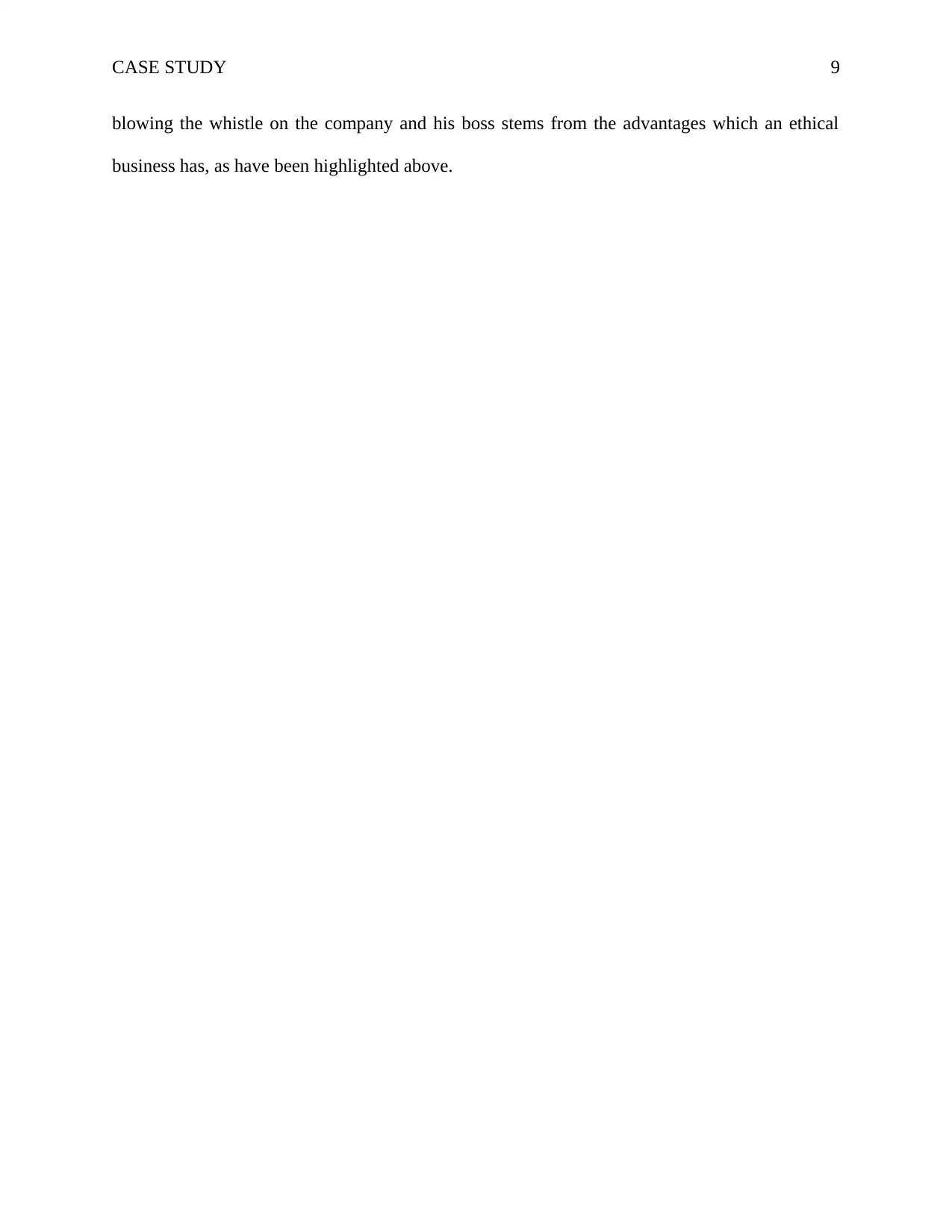
CASE STUDY 9
blowing the whistle on the company and his boss stems from the advantages which an ethical
business has, as have been highlighted above.
blowing the whistle on the company and his boss stems from the advantages which an ethical
business has, as have been highlighted above.
⊘ This is a preview!⊘
Do you want full access?
Subscribe today to unlock all pages.

Trusted by 1+ million students worldwide
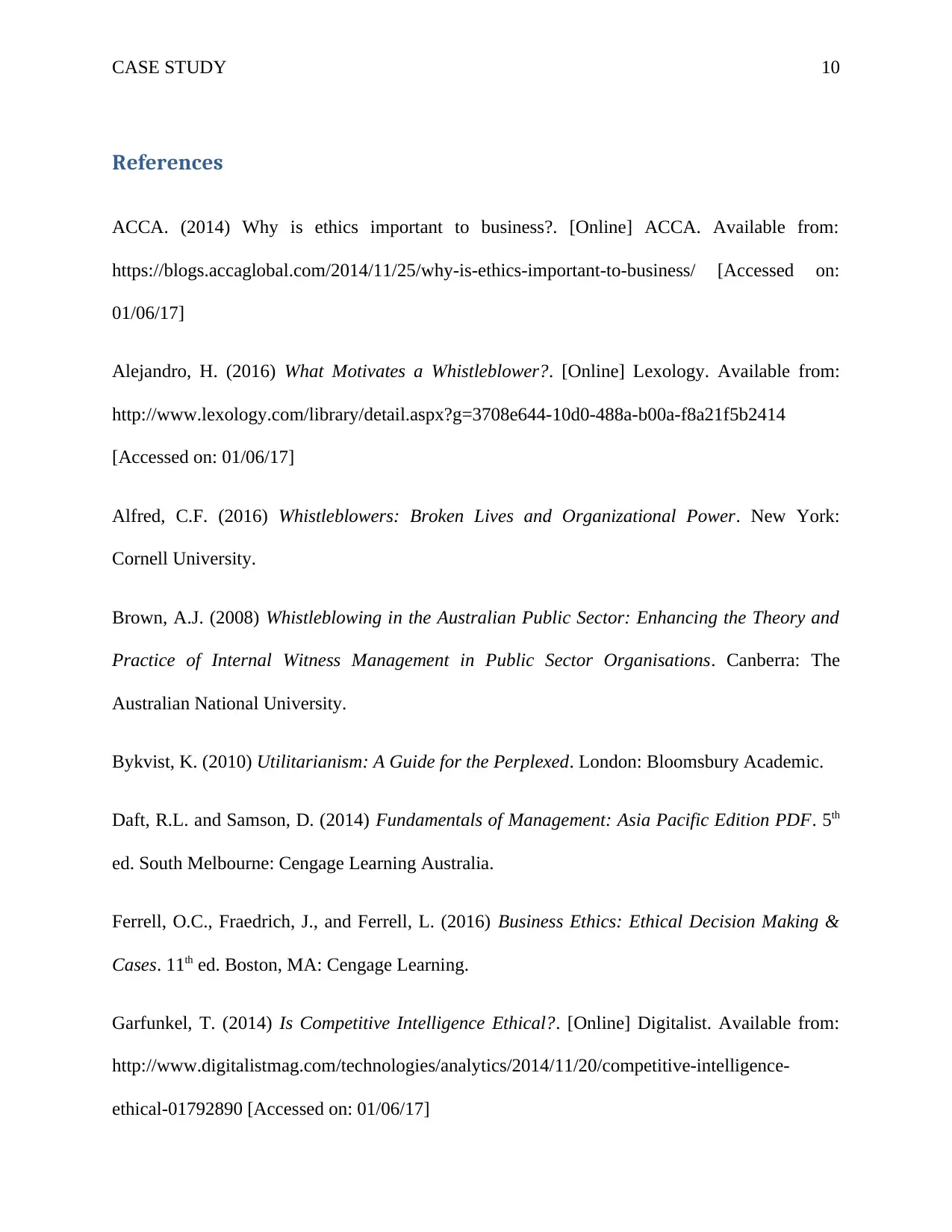
CASE STUDY 10
References
ACCA. (2014) Why is ethics important to business?. [Online] ACCA. Available from:
https://blogs.accaglobal.com/2014/11/25/why-is-ethics-important-to-business/ [Accessed on:
01/06/17]
Alejandro, H. (2016) What Motivates a Whistleblower?. [Online] Lexology. Available from:
http://www.lexology.com/library/detail.aspx?g=3708e644-10d0-488a-b00a-f8a21f5b2414
[Accessed on: 01/06/17]
Alfred, C.F. (2016) Whistleblowers: Broken Lives and Organizational Power. New York:
Cornell University.
Brown, A.J. (2008) Whistleblowing in the Australian Public Sector: Enhancing the Theory and
Practice of Internal Witness Management in Public Sector Organisations. Canberra: The
Australian National University.
Bykvist, K. (2010) Utilitarianism: A Guide for the Perplexed. London: Bloomsbury Academic.
Daft, R.L. and Samson, D. (2014) Fundamentals of Management: Asia Pacific Edition PDF. 5th
ed. South Melbourne: Cengage Learning Australia.
Ferrell, O.C., Fraedrich, J., and Ferrell, L. (2016) Business Ethics: Ethical Decision Making &
Cases. 11th ed. Boston, MA: Cengage Learning.
Garfunkel, T. (2014) Is Competitive Intelligence Ethical?. [Online] Digitalist. Available from:
http://www.digitalistmag.com/technologies/analytics/2014/11/20/competitive-intelligence-
ethical-01792890 [Accessed on: 01/06/17]
References
ACCA. (2014) Why is ethics important to business?. [Online] ACCA. Available from:
https://blogs.accaglobal.com/2014/11/25/why-is-ethics-important-to-business/ [Accessed on:
01/06/17]
Alejandro, H. (2016) What Motivates a Whistleblower?. [Online] Lexology. Available from:
http://www.lexology.com/library/detail.aspx?g=3708e644-10d0-488a-b00a-f8a21f5b2414
[Accessed on: 01/06/17]
Alfred, C.F. (2016) Whistleblowers: Broken Lives and Organizational Power. New York:
Cornell University.
Brown, A.J. (2008) Whistleblowing in the Australian Public Sector: Enhancing the Theory and
Practice of Internal Witness Management in Public Sector Organisations. Canberra: The
Australian National University.
Bykvist, K. (2010) Utilitarianism: A Guide for the Perplexed. London: Bloomsbury Academic.
Daft, R.L. and Samson, D. (2014) Fundamentals of Management: Asia Pacific Edition PDF. 5th
ed. South Melbourne: Cengage Learning Australia.
Ferrell, O.C., Fraedrich, J., and Ferrell, L. (2016) Business Ethics: Ethical Decision Making &
Cases. 11th ed. Boston, MA: Cengage Learning.
Garfunkel, T. (2014) Is Competitive Intelligence Ethical?. [Online] Digitalist. Available from:
http://www.digitalistmag.com/technologies/analytics/2014/11/20/competitive-intelligence-
ethical-01792890 [Accessed on: 01/06/17]
Paraphrase This Document
Need a fresh take? Get an instant paraphrase of this document with our AI Paraphraser
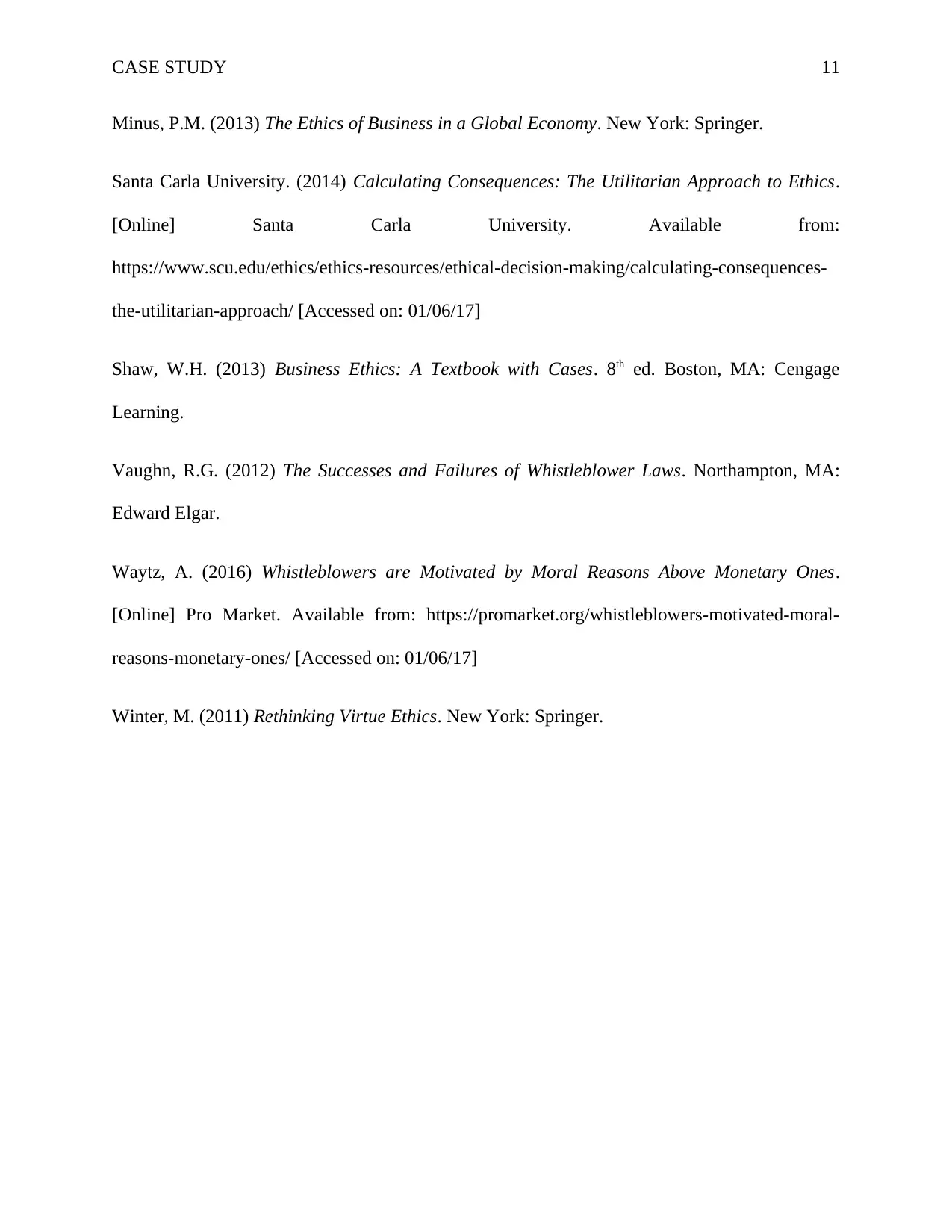
CASE STUDY 11
Minus, P.M. (2013) The Ethics of Business in a Global Economy. New York: Springer.
Santa Carla University. (2014) Calculating Consequences: The Utilitarian Approach to Ethics.
[Online] Santa Carla University. Available from:
https://www.scu.edu/ethics/ethics-resources/ethical-decision-making/calculating-consequences-
the-utilitarian-approach/ [Accessed on: 01/06/17]
Shaw, W.H. (2013) Business Ethics: A Textbook with Cases. 8th ed. Boston, MA: Cengage
Learning.
Vaughn, R.G. (2012) The Successes and Failures of Whistleblower Laws. Northampton, MA:
Edward Elgar.
Waytz, A. (2016) Whistleblowers are Motivated by Moral Reasons Above Monetary Ones.
[Online] Pro Market. Available from: https://promarket.org/whistleblowers-motivated-moral-
reasons-monetary-ones/ [Accessed on: 01/06/17]
Winter, M. (2011) Rethinking Virtue Ethics. New York: Springer.
Minus, P.M. (2013) The Ethics of Business in a Global Economy. New York: Springer.
Santa Carla University. (2014) Calculating Consequences: The Utilitarian Approach to Ethics.
[Online] Santa Carla University. Available from:
https://www.scu.edu/ethics/ethics-resources/ethical-decision-making/calculating-consequences-
the-utilitarian-approach/ [Accessed on: 01/06/17]
Shaw, W.H. (2013) Business Ethics: A Textbook with Cases. 8th ed. Boston, MA: Cengage
Learning.
Vaughn, R.G. (2012) The Successes and Failures of Whistleblower Laws. Northampton, MA:
Edward Elgar.
Waytz, A. (2016) Whistleblowers are Motivated by Moral Reasons Above Monetary Ones.
[Online] Pro Market. Available from: https://promarket.org/whistleblowers-motivated-moral-
reasons-monetary-ones/ [Accessed on: 01/06/17]
Winter, M. (2011) Rethinking Virtue Ethics. New York: Springer.
1 out of 11
Related Documents
Your All-in-One AI-Powered Toolkit for Academic Success.
+13062052269
info@desklib.com
Available 24*7 on WhatsApp / Email
![[object Object]](/_next/static/media/star-bottom.7253800d.svg)
Unlock your academic potential
Copyright © 2020–2026 A2Z Services. All Rights Reserved. Developed and managed by ZUCOL.


